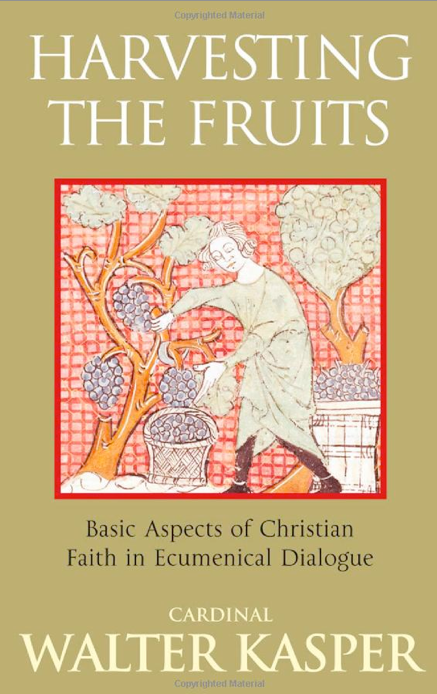Product information includes: Publisher, Continuum (December 14, 2009); ISBN-10 - 1441162720 and an updated ISBN-13 - 978-1441162724
 "Harvesting the Fruits" references Galatians 6:9, "So let us not grow weary in doing what is right, for we will reap at harvest-time, if we do not give up." As the title of the book and the featured scripture imply, this is not a season of frustration or discouragement in ecumenical relations, we are not in an ecumenical winter, but "rich fruits" already have been harvested from these and other dialogues.
"Harvesting the Fruits" references Galatians 6:9, "So let us not grow weary in doing what is right, for we will reap at harvest-time, if we do not give up." As the title of the book and the featured scripture imply, this is not a season of frustration or discouragement in ecumenical relations, we are not in an ecumenical winter, but "rich fruits" already have been harvested from these and other dialogues.Writing about "ecumenical consensus, convergences and differences" over the biblical number of the past 40 years, Walter Cardinal Kasper brings us an easily readable, very useful overview of formal, bilateral conversations between worldwide organizational expressions of Christianity: Lutherans and Catholics / Methodists and Catholics from 1967 through the publication date of 2009; Reformed and Catholics / Anglicans and Catholics from 1970 through 2009. These dialogues were grounded in "Catholic understanding of ecumenical dialogue" and ecumenical principles stated in Vatican 2 documents Unitatis redintegratio and Lumen gentium and as Cardinal Kasper notes, they reflect multilateral interrelationships amongst the various expressions of Christianity that participated. The book is comfortable to hold, has an easily readable type face (style and point size) and includes a near-comprehensive list of abbreviations from each phase or period of each formal dialogue, one of several features that make it a wonderful reference book. The author attempts to outline where we are at this present time as well as where we in the churches can move ahead and should move ahead in the quest for common unity. Cardinal Kasper uses the traditional, 2-millennia-long theological "Father, Son, Spirit" theological vocabulary without equivocation or apology.
Harvesting the Fruits is logically organized into an introduction, four chapters and preliminary conclusions (at the end). Chapter subjects are:
1. Jesus Christ and the Trinity; 2. Salvation, justification, sanctification; 3. The Church - Nature and mission; Sources of authority; Ministry - "whole people of God" and "ordained"; Episcope / oversight - of both local church and Universal Church; 4. [dominical] Sacraments - baptism and EucharistParticularly beginning with the Vatican 2 Decree on Ecumenism, Unitatis redintegration in 1964, the See of Rome has considered restoration of unity in the Church a primary concern; Jesus Christ founded one Church, and only one. This particular book does not include Easter or Orthodox expressions of the Church (Cardinal Kasper refers to those as "Churches" but calls other non-Roman Catholics ecclesial communities). Except for those of Wesleyan heritage the Pentecostal churches do not participate in ecumenical activities and except when one includes the highly ecumenical Disciples of Christ (in the USA) in that category, church bodies that evolved from the various restoration movements in the 19th Century are not inclined toward ecumenism, either.
For these discussions a "common confession of the Trinity and of Jesus Christ" was the starting point. The ultimate goal of ecumenical dialogue and other shared activities includes "full visible communion in faith, sacramental life, apostolic ministry and mission" alongside the invariable and necessary differences in culture, styles of liturgy, hymnody and worship, as well as differing emphases in all the above... All of the ecumenical partners hold a fundamental common understanding of the Gospel including: creedal faith; Trinitarian conviction; and salvific action of the persons of the Trinity. Despite the basic need for more conversation and consensus, "What we share in faith is therefore much more than what divides us."
my amazon review: a healthy yield with more to come

No comments:
Post a Comment
thanks for visiting—peace and hope to all of us!